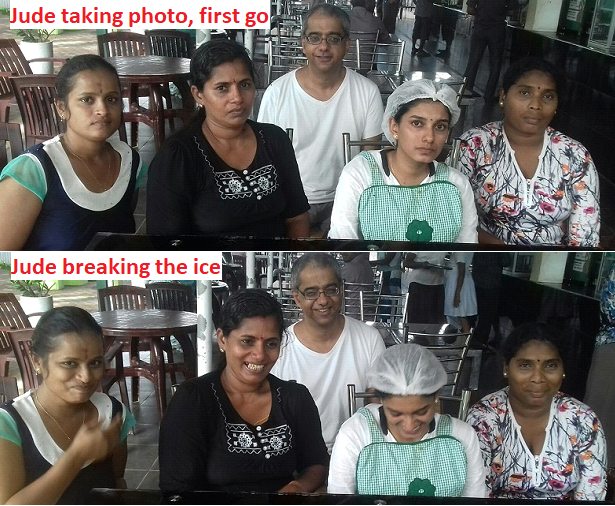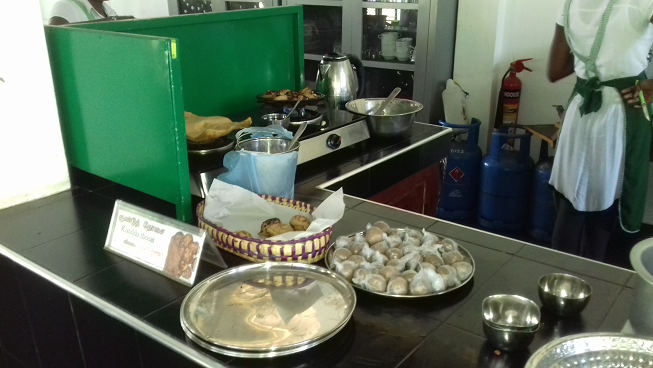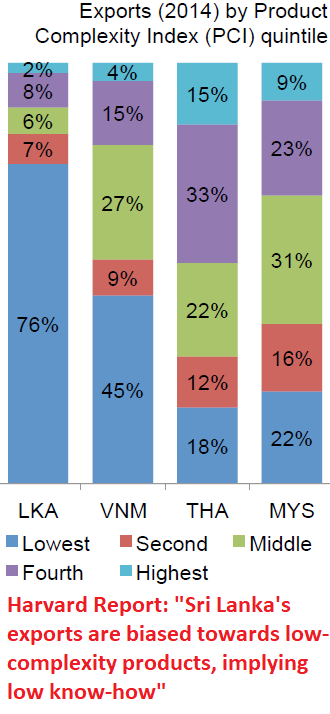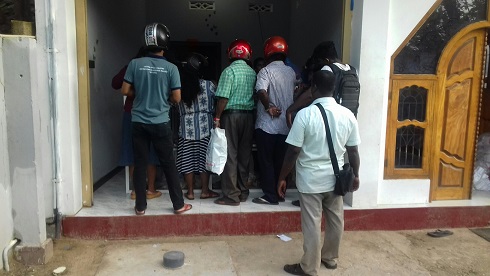Take a look in Ammachi!
 I consider it fantastic because of the business model. Run by Sri Lanka’s Department of Agriculture the whole food court infrastructure is provided. A warehouse sized covered area with everything from several mini kitchens to plates and cups and tables and chairs and bins and sinks and toilets. The ladies (as far as I can tell, no men) pay a couple of hundred rupees to rent a kitchen for half a day (two shifts per day: 7am-1pm; 1pm-7pm). They provide their own consumables, their gas and ingredients. They decide what they will make and how much of it. And they keep all the money they earn selling their food, or bear the loss if they don’t sell enough. They are quintessential entrepreneurs.
I consider it fantastic because of the business model. Run by Sri Lanka’s Department of Agriculture the whole food court infrastructure is provided. A warehouse sized covered area with everything from several mini kitchens to plates and cups and tables and chairs and bins and sinks and toilets. The ladies (as far as I can tell, no men) pay a couple of hundred rupees to rent a kitchen for half a day (two shifts per day: 7am-1pm; 1pm-7pm). They provide their own consumables, their gas and ingredients. They decide what they will make and how much of it. And they keep all the money they earn selling their food, or bear the loss if they don’t sell enough. They are quintessential entrepreneurs.
Ammachi is an excellent introduction to entrepreneurship for ordinary people without access to capital and connections. Be they housewives or school leavers or frustrated employees, Ammachi provides a low risk route to learn how to run a business in a high quality and safe environment. The ladies learn disciplines from getting out of bed on time, to budgeting, assessing and reacting to customer demands, ensuring quality, and maintaining hygiene standards to pass random inspections. By chance an inspection actually happened during this interview, as the ladies explained to us why a pair of khaki clad men were pacing around the premises for several minutes.
To find out more, I visited the Jaffna Ammachi with my good friend Jude Joseph who is not only a great trilingual translator (a necessity with me speaking no Tamil nor Sinhala), but also knows how to raise a smile and break the ice to get normally reticent people talking.
 Timing our arrival to catch the 1pm change from morning to afternoon shifts, we spoke with a small group of the Ammachi ladies.
Timing our arrival to catch the 1pm change from morning to afternoon shifts, we spoke with a small group of the Ammachi ladies.
I asked what they did before they joined Ammachi. Two stayed at home, one housewife and one school leaver; one worked for an NGO supporting women headed families; another had a flower business; one had worked in the Middle East as a housemaid. They had between zero and four children each. One is unmarried, two had been abandoned by their husbands while other spouses worked as a driver, a carpenter, and a painter.
How had they started at Ammachi? One had been trained in mushroom cultivation, and then joined Ammachi to monetize her skill. Her Ammachi stall specialises in mushroom based foods, including a soup and mushroom cutlets. On my earlier visits to Ammachi before this interview, I have more than once eaten her mushroom soup which is full of the wholesome fungus and vegetables and is a delicious and cheap (Rs50, if I remember right) meal by itself. After awhile she brought three other ladies, her friends, to join Ammachi. Another lady was introduced to Ammachi by her mother who is with the Department of Agriculture doing honeybee development. Another has a food stall near Jaffna Fort which she runs in the mornings, and then comes to Ammachi for the afternoon shift.
The ladies receive valuable training and support from the Department of Agriculture. They are taught how to buy their raw ingredients, how to cook, maintain hygiene standards, deal with customers and their cash, how to budget, and other things necessary for a small business. The lady running the fruit juice stall was trained in purchasing and preparing various fruits including Papaw, Woodapple, Pineapple, Mango and Watermelon. Delicious drinks she sells for Rs50 for a large glass (I particularly recommend the Woodapple juice, as well as all the others). She was also making Nannari (Sarsparilla) Tea, a non-trivial process to produce what is considered an effective ayurvedic health drink.
What days are busiest? Tuesday, Friday, Saturday and Sunday. Why Tuesday, I asked? Because Hindus tend to be vegetarian on Tuesdays (I learned something new). What time do they start work? This depends on what they are selling. The lady who has to prepare cow peas and lentils is up at 3am. The one who does the fruit juices which don’t need much preparation stays in bed much later, rising to get to Ammachi in time for the start of her 7am shift. They generally earn enough after their running costs to take home anything between one and two thousand rupees each day. The fruit juice lady breaks even or makes a loss on rainy days, but makes a good profit on a normal Jaffna scorcher. I asked what they do with surplus food at the end of the day, to be told some goes into the bin while some is given away for free. Avoiding losing money is a great incentive to improve your product and get your demand estimates right. So you don’t have an excess to throw away, and you don’t run out of product when there are still customers waiting to give you money for it.

I asked them what else they get from their work at Ammachi. The ladies were eager to say as well as the cooking and business skills, they gain Self Confidence and Courage and the belief they can succeed in lifting their family’s livelihoods. Their inner strength and confidence was certainly clear to me. They had no hesitation looking Jude and me in the eye and responding to questions and giving their opinions, in stark contrast to the many tongue-tied timorous people I have encountered across Sri Lanka. The ladies laughingly commented that this was the first time they had heard one of their colleagues talk. The formerly silent one laughed too, and talked some more. It just shows that sometimes people don’t stay silent because they have nothing to say, but because nobody asks them to say it. Jude and I agreed that creating that new link between the ladies was one of the successes of our visit.
They also learn supervisory skills, as they take turns to oversee the cleanliness and quality of the whole food court, and ensuring supplies of gas and other basic requirements are maintained. They aren’t shy to scold a colleague for leaving a mess, knowing that they too will be scolded should they fail to maintain standards of hygiene and food quality.
After 2 or 3 years at Ammachi, the ladies are well equipped with the strength, confidence, discipline and skills to setup their own eateries back in their villages. Though they don’t seem to be in a hurry to leave Ammachi, where they have their safe and friendly community.
Strength, confidence, discipline and skills are essential for a successful entrepreneur. People with these traits can be found if you look hard enough in Jaffna, in the North, and in Sri Lanka. But these traits by themselves are insufficient, there are other assets needed. Add market access, a strong contact network, and money, and you are closer but still not there. Add the resilience to fail, perhaps many times, and still survive to learn from your mistakes and try again and perhaps there you have it. And don’t underestimate the value of Luck.
As Emperor Napoleon Bonaparte is supposed to have said, “I’d rather have lucky generals than good ones”.
These other assets are in extremely short supply, particularly in the Northern Province. They are actually in short supply across Sri Lanka, and are being hoarded in the Western Province to the cost of all other provinces not only the Northern Province.
 A fascinating report from 2017/2018 titled “Sri Lanka Growth Diagnostic Analysis” by Harvard University’s Centre for International Development states that Sri Lanka as a whole’s exports are heavily weighted to unsophisticated products. And that national job creation is greatest in low skill sectors.
A fascinating report from 2017/2018 titled “Sri Lanka Growth Diagnostic Analysis” by Harvard University’s Centre for International Development states that Sri Lanka as a whole’s exports are heavily weighted to unsophisticated products. And that national job creation is greatest in low skill sectors.
This is a chronic national problem. When Sri Lanka’s public and private sectors creepingly slowly get around to addressing it, the North will be pretty low on the priority list.
One way for the North to jump the queue is for the Diaspora to participate more enthusiastically. Already there are a few doing this. Those I personally know building high value enterprises here include
♦ a consultant heart surgeon from Oxford (high value agriculture, his Aloe Vera farm is a wonderful sight as will be his planned processing plant if he can raise investment);
♦ a furniture manufacturer from Toronto (palmyrah based drinks, I can recommend his long-life toddy as well as his palmyrah arrack);
♦ a techie from California’s Silicon Valley (point of sales systems (POS) being developed by people without university degrees in a small office above a bank in Jaffna Town. The systems are already being sold in Sri Lanka with plans to be launched internationally);
♦ an agro-ecologist from New York (coconut husk products to be exported to the USA).
There are also a handful of others already active, and another handful making serious enquiries. I will write about some of them in the coming months. But these are too few to make a quick impactful difference. More are needed.
When I talked with the ladies at Ammachi, I was again convinced that there are impressive entrepreneurs here in the North. It’s not just them. When I arrived in Jaffna in 2015 there was a stall selling excellent rolls and sweets. A few months ago they upgraded their business premises so it is now in the ground floor of their house. Only open from 3pm until they sell out, 2-3 hours later, as well as great rolls and sweets they produce perhaps the best chilli crisps in Sri Lanka. Doling them into plastic bags from a big barrel at an exceedingly low price. Crunching through the occasional lump of spicy powder reminds me of my late father’s tales of his Jaffna childhood, and the chillies he and his brothers would stuff into their mouths in spite of the pain and the tears rolling down their faces unable to resist their deliciousness. “We would scream and eat” he told us. The crisps don’t induce screams, though sometimes a tear. There are promising micro businesses like these that can be taken to another level.

When asked “what good has the government ever done for us?”, I have no hesitation in citing Free Education and Ammachi!
( — The writer Jekhan Aruliah was born in Sri Lanka and moved with his family to the UK when he was two years of age. Brought up in London, he graduated from Cambridge University in 1986 with a degree in Natural Sciences. Jekhan then spent over two decades in the IT industry, for half of which he was managing offshore software development for British companies in Colombo and in Gurgaon (India). In 2015 Jekhan decided to move to Jaffna where he is now involved in social and economic projects. He can be contacted at — )
Excellent article